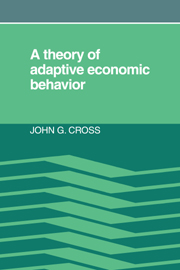Book contents
- Frontmatter
- Contents
- Preface
- 1 Introduction
- 2 Models of convergence
- 3 Behavior in the short run
- 4 Uncertainty
- 5 An application to state lottery games
- 6 An application to the problem of search behavior
- 7 Inflationary disequilibrium
- 8 Advertising and imitation
- 9 An application to migration
- 10 Conclusions
- References
- Index
5 - An application to state lottery games
Published online by Cambridge University Press: 07 October 2011
- Frontmatter
- Contents
- Preface
- 1 Introduction
- 2 Models of convergence
- 3 Behavior in the short run
- 4 Uncertainty
- 5 An application to state lottery games
- 6 An application to the problem of search behavior
- 7 Inflationary disequilibrium
- 8 Advertising and imitation
- 9 An application to migration
- 10 Conclusions
- References
- Index
Summary
From the perspective of optimization theory, the willingness of people to gamble has always posed something of a dilemma. The general acceptance of the expected-utility hypothesis, together with the belief that utility may be represented as a concave function of payoff, has led most economists to conclude that consumers will ordinarily avoid even actuarially fair gambles and will be willing to pay premiums for the assurance that the risks they face will be reduced. This expectation is in constant conflict with everyday evidence that people often accept actuarially unfair gambles, and this conflict has become even more dramatic in recent years as state-run lottery games have proliferated and become significant sources of revenue in several jurisdictions.
The most common response among defenders of the expected-utility model has been to adapt the specification of preferences in a way that will bring the theory into conformity with observation. Some maintain that the act of gambling provides so much enjoyment that individuals are willing to pay for it in the form of the difference between the cost of a lottery ticket and its actuarial value. Others sacrifice the property of concavity of utility functions over some limited range. Friedman and Savage (1948) suggested that there were (lower) income classes over which concavity might not hold and that members of these groups would be found to engage in gambling in an attempt to alter their economic situation.
- Type
- Chapter
- Information
- A Theory of Adaptive Economic Behavior , pp. 84 - 99Publisher: Cambridge University PressPrint publication year: 1983



